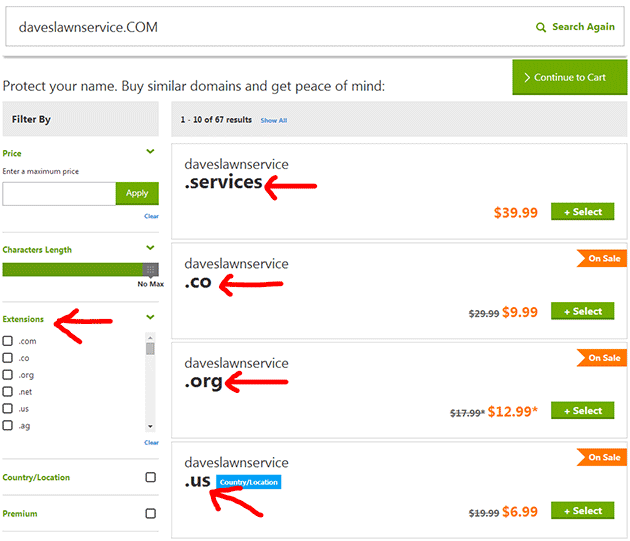
Registering Your Exact Business Name Domain –
If You’re Lucky
When a business first starts their search for a domain name, they usually start by searching for their exact business name.
Let’s take a fictitious business named Dave’s Lawn Service for example. Dave would probably search for DavesLawnService.com. If it’s available, then Dave is a lucky man! With so many .com domains already snatched up, the chance of finding your domain on the first try is about as high as a kite on a calm day.
If the first choice is not available, the next step most people take is considering other top level domains. Top level domains are the last part of the domain name – the part after the “dot”. They are sometimes called domain name extensions.
In DavesLawnService.com, “.com” is the extension (or top level domain).
So if the .com domain is not available for Dave, the domain registrar will probably recommend other domain extensions like the following:

Most people prefer .com for a small business since it’s the most common and often assumed. The “com” in “.com” was originally intended to signify “commercial” so it works for a small business in that way too.
If you can’t find a .com for your small business. I prefer .net. It is the 2nd most popular domain extension and easy to remember.
Any extension will work for your website and shouldn’t affect your search engine optimization or rankings in the future. The important factors to consider are readability, memorability, and relevance (i.e. Don’t get a .edu if you’re not an educational institution.)
EMDs – Keywords in Your Domain
In an overhyped SEO culture, many small business owners plot to conquer Google by registering an exact match keyword domain. An exact match domain (EMD) is a domain with your exact target keyword in it.
For example, if Dave’s Lawn Service is located in Orlando, he might consider registering the domain…
OrlandoLawnService.com (not too bad)
or
AffordableCheapLawnServiceOrlando.com (BAD IDEA!)
What’s so bad about this 2nd domain you ask?
First off – it’s long and difficult to remember. And secondly, stuffing keywords in your domain name doesn’t help for SEO as much as it did in the past. Google does not give as much weight in its algorithms to the words in the domain, although they do still have some value.
The days of automatically ranking at the top of search engines because your domain is the exact keyword that was searched are OVER.
There are hundreds of factors considered by search engines when ranking sites. The domain name is a factor but it’s a minuscule factor in a large and complex algorithm.
So my opinion, and Google’s recommendation, is to register your brand name as a domain and build your reputation rather than trying to trick the search engines with an exact match keyword domain.
How many big companies do you know who have exact match domain names? NONE!
They all have their brand name for their domain because they recognize the importance of building their brand. I know you’re not a Fortune 500 company, but the priorities should be the same for your small business.

How long is TOO long for a domain name?
There’s no set acceptable length for a domain name but there are a few things you should consider.
- Easy to remember – the shorter your domain, the easier it is to remember. I like to keep a domain to 3 words, or even two if possible.
- Cost – Short domain names of 1 or 2 words can sometimes be considered premium domain names and can cost $1,000+, especially if the 2 words are highly competitive words.
- Typing and speaking – Before getting a long domain name, consider how annoying it will be for your customers or employees to type or speak your domain name. Your employees may have to speak it to customers in the field. Your customers will have to type it in the address bar and when they type out your email address. A shorter domain will make all these tasks more efficient.
Hyphens-In-Domain-Names
 Some people add hypens to domain names when their preferred domain name is not available. For example, if DavesLawnService.com wasn’t available, Dave might be tempted to register, Daves-Lawn-Service.com. I’m not a fan of this because it’s difficult to communicate to people, hard to remember, and a pain to type.
Some people add hypens to domain names when their preferred domain name is not available. For example, if DavesLawnService.com wasn’t available, Dave might be tempted to register, Daves-Lawn-Service.com. I’m not a fan of this because it’s difficult to communicate to people, hard to remember, and a pain to type.
Think about having to speak your website domain to someone. You’d have to say, “My website is daves dash lawn dash service dot com”. It sounds a little ridiculous and it’s not easy on the brain cells.
There may be some instances where hyphens are an OK idea, but for most small businesses, I can’t recommend them and would instead encourage investigating adding an extra word or searching different domain extensions.
Cost – FREE Domain names?
 A lot of people ask me about getting their domain name for free. Unfortunately, there aren’t any companies just handing out domain names for free. If you are able to find a free domain name, it’s usually tied to a service, like getting a free domain name with a purchase of 1 year of hosting.
A lot of people ask me about getting their domain name for free. Unfortunately, there aren’t any companies just handing out domain names for free. If you are able to find a free domain name, it’s usually tied to a service, like getting a free domain name with a purchase of 1 year of hosting.
Read About.com’s advice on How to Get a Free Domain Name
I talk to a lot of people trying to transfer their domain name from one service to another after getting a free domain name from Company A and wanting to switch it to Company B. I always recommend purchasing a domain name separately from other services like hosting so that you can switch your services easily in the future.
One reason that companies give out free domains with hosting services is that they know if they have your domain name, they have you in a sense. They can charge fees for you to transfer the domain or just make the process difficult.
If you’re caught in this situation, watch my video showing how to transfer your domain away from your current provider.
Price is usually the #1 consideration when considering any cost in your small business, but this isn’t usually the case for domain names because they are relatively inexpensive. Domains usually cost around $10 for the first year and $15-20/year after that. Learn more on Business Name Generator.
Godaddy for Domain Names – Love or Hate?
Godaddy is a polarizing company. If you research their reputation, you will find people who love them and hate them. I don’t recommend them highly for website hosting, email, or their website builder, but I do recommend them for domain names and have used them myself for over 10 years.
Their interface and speed for domain transactions is the best I’ve seen in the industry.
To register a domain name, go to Godaddy.com and start your search. You can watch my video to see domain registration on Godaddy in action.
I purchased my domain name…now what?
Purchasing a domain name is only the first step to getting a website. It’s an important decision but it’s usually a cakewalk compared to the actual creation of a website. Read my post here to find out what to do next?
